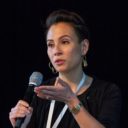In the ‘Power Matters – Leadership Culture in Philanthropic Organisations’ session at the European Foundation Centre conference, my table held a lively debate about ‘diversity’. This catch-all term was used to frame a conversation on how to recruit staff from a range of backgrounds, a notion that received surprising pushback.
The resistance to this issue came in three areas. Firstly, it wasn’t seen as necessary for many foundations. We had just heard from Trust for London about why they feel that recruiting people with lived experience of poverty is important. Because Trust for London fund poverty, those at the table viewed these efforts to be ‘mission-aligned’. Because their organisations fund other issues, they didn’t see why having a representative workforce was relevant to them.
My response was an instrumentalist one. Whether you are funding culture, climate or human rights, different people bring different perspectives. To have a workforce with a range of backgrounds brings fresh ideas, insight and networks.
The second concern was that by focussing on race, gender and disability, we overlook other areas. In the UK, class is a major issue, yet how can organisations monitor that? Several attendees felt that having a range of nationalities was a challenge for them. One organisation said they would like to recruit people with experiences of unemployment.
My response would be that just because something is hard, it doesn’t mean we shouldn’t try. In job adverts, we could ask something like: ‘Please mention any lived experience you have of disadvantage you may have. We would be particularly interested to hear about any experience you have of unemployment’.
The third challenge was one that I hear a lot in Europe. ‘Counting minorities in your workforce is reductive and simplistic. It seems offensive’. The argument is that by focussing on a person’s race, disability or gender is to reduce them to these characteristics. Answers to questions about reductionist thinking in affirmative action can be found elsewhere, but my sense is that some people are unconvinced by the logic of inclusion. The view appears to be ‘I’m not racist. So why does my race matter? We should move beyond that’.
The myth of the post-racial society, or the notion that the battle for women’s rights has been won, is obvious fiction. As noted during the excellent final plenary, we are not born equal: some people benefit from ‘positive discrimination’ from birth. It’s no coincidence that many people in positions of power look similar. But even if we were at the point where people no longer carried the prejudices we were raised with, there are still reasons for including a wider range of voices in philanthropy. The participation of people who hold substantially different experiences enriches organisations in myriad ways. And society at large is enhanced when marginalised people are recognised as leaders.
During the conference I also attended a walking tour. We visited the town of Vilvoorde, where a coalition of actors are leading efforts to combat marginalisation and subsequent aggression amongst young people. Almost everyone working on this initiative was from the Muslim community. When asked ‘How did you engage the local mosques?’, the answer was obvious: the policeman, the social worker, the NGO founder – they all attend those mosques. The trust, network and community knowledge already exists.
Back to my table at the EFC conference. One point we did all agree on was that ‘It shouldn’t be about numbers’. Of course, inclusivity is about attitudes and mindsets, not tickboxes and tokenism. But even a single representative of a marginalised community can have an impact if their views are respected (take this airport security guard). Even thinking about ‘numbers’ – and in doing so, recognising your homogeneity and reflecting on it – would be start.
I feel the resistance to the ‘diversity agenda’ is partly a lack of imagination and interest. There are further instrumental reasons for encouraging the leadership of a broad range of people. But it’s also matter of our organisations embodying our vision for a better world.
Do you believe that people who are different to you are valuable? Do you think that what makes them different to you could be valuable? And if so, why do you not value including them?
Rose Longhurst is an Atlantic Fellow for Social and Economic Equity.



Comments (0)